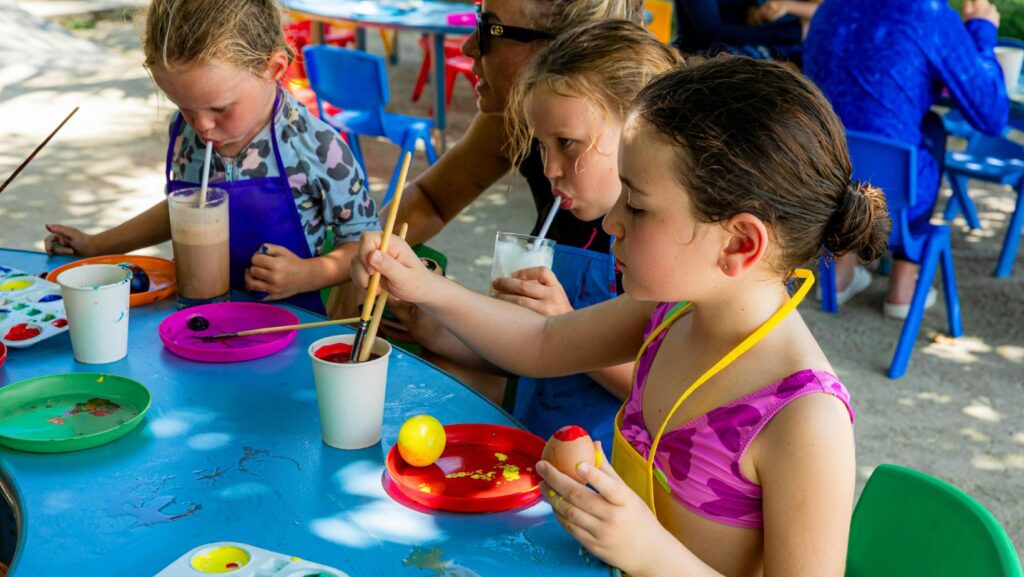In today’s technology-driven world, children are surrounded by digital media from infancy. Screens now serve as teachers, entertainers, and companions. Yet, as access to digital content grows, so does the concern over what is being replaced—unstructured outdoor play and nature-based discovery. Daycare with extracurricular activities increasingly emphasize the necessity of balancing digital engagement with direct, sensory experiences in natural environments. The concept of “green time” embodies this shift, encouraging educators and parents to restore outdoor exploration as a central element of early learning.
Why Kids Need More Green Time
Children’s brains develop most effectively through movement, touch, and multisensory engagement—activities inherently found in outdoor environments. The American Academy of Pediatrics reports that children require at least 60 minutes of active play daily to maintain optimal physical and emotional health. Unfortunately, excessive screen exposure often limits spontaneous movement, diminishing opportunities for balance, coordination, and creative thinking.
Green time provides a counterbalance by integrating physical activity, sensory exploration, and imagination. Outdoor play encourages children to engage dynamically with the world—running, climbing, observing insects, and inventing stories from natural stimuli. These experiences enhance neural plasticity and emotional resilience while supporting self-regulation and attention control. For city-dwelling families, structured exposure to nature is particularly crucial; it anchors children in tangible experiences, fostering confidence and curiosity that screens alone cannot replicate.
The Science Behind Outdoor Play and Child Development
Scientific inquiry into early childhood learning consistently highlights the neurocognitive value of outdoor play. When children engage with natural textures, variable terrain, and open-ended play materials, they activate complex sensory-motor pathways that strengthen both brain hemispheres. The result is a more balanced and adaptive cognitive system capable of sustained attention and creative problem-solving.
Benefits for Focus, Motor Skills, and Emotional Balance
Research demonstrates that outdoor engagement enhances executive function, fine motor coordination, and emotional regulation. It nurtures a sense of autonomy and empathy, as children navigate challenges collaboratively and interpret real-world consequences. These gains are particularly pronounced when outdoor play is intentionally integrated into structured educational frameworks.
Key benefits include:
- Improved concentration and task persistence through reduced sensory fatigue and increased oxygenation.
- Strengthened motor control via climbing, balancing, and object manipulation in diverse environments.
- Heightened emotional stability from natural sunlight exposure and stress reduction through physical activity.
- Enhanced creativity and cognitive flexibility fostered by open-ended, self-directed exploration.
- Stronger peer relationships as outdoor settings naturally promote communication and cooperation.
Each of these outcomes contributes to long-term academic readiness, emotional intelligence, and physical wellness, forming the foundation of whole-child education.
How Little Scholars NYC Integrates Nature into Daily Learning
Outdoor learning is a core pedagogical principle at Little Scholars NYC, a leading daycare with extracurricular activities serving families across Brooklyn and Manhattan. Since its founding in 2013, the organization has expanded to eight centers, all designed to provide accessible, inclusive, and developmentally balanced early education.
Outdoor Classrooms, Gardening, and Sensory Exploration
Each Little Scholars location blends NYC DOE/Universal Pre-K standards with play-based, STEM-enriched learning and arts integration. Educators—trained and credentialed in early childhood education—facilitate outdoor learning that aligns with cognitive and social milestones. Children participate in gardening, weather observation, and tactile discovery, transforming outdoor time into active laboratories for inquiry.
Program highlights include:
- Multiple NYC locations: Strategically located in Brooklyn and Manhattan for convenient family access.
- ACS/HRA voucher acceptance: Expanding educational equity and affordability.
- Brightwheel app: Providing real-time communication and visual updates for parents.
- Holistic curriculum: Supporting development across cognitive, emotional, physical, and social domains.
- Nutritious meals: Prepared under the State Food Program (CACFP) to meet dietary and energy needs.
These features, combined with a multicultural and inclusive philosophy, cultivate a strong sense of belonging and community. Whether in infant care, toddler programs, preschool, 3K, UPK, extended care, or “Mommy & Me” sessions, outdoor play is treated as both an educational medium and a social-emotional foundation.
Parent Tips for Limiting Screen Time and Encouraging Exploration
Parents are critical partners in balancing technology with hands-on discovery. Establishing consistent routines and modeling balanced behavior reinforces what children learn in school. To create a healthier digital-environmental balance, experts recommend:
- Designing screen-free zones at home to promote interpersonal connection.
- Modeling active curiosity by participating in outdoor family activities.
- Pairing digital content with real-world learning, such as exploring nature after watching educational videos.
- Incorporating outdoor play into daily routines, even in short intervals like walks or playground visits.
- Communicating with teachers through digital tools such as Brightwheel to align goals and progress.
Applying these practices transforms learning into a continuous, shared process that bridges home and school. When parents and educators collaborate, children receive a unified developmental message—learning extends beyond screens into the world around them.
Conclusion: Building Healthy, Balanced Childhoods
Little Scholars NYC demonstrates how this philosophy can thrive within an urban environment. Through its licensed childcare programs, DOE-affiliated 3K and UPK offerings, and extended care options, the organization provides structured yet playful learning experiences rooted in exploration. Its commitment to inclusivity, family engagement, and educator excellence exemplifies what a holistic, future-ready early education model can achieve.
By fostering curiosity through outdoor engagement, Little Scholars NYC equips children not only to excel academically but to live with confidence, empathy, and balance. In every garden planted, every discovery made, and every moment away from the screen, a healthier, more connected childhood takes root.
